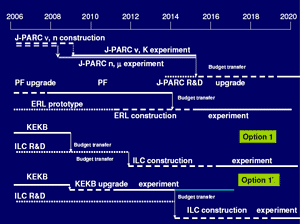Director's Corner
11 January 2007
 Barry Barish |
Japan HEP Community Promotes a Future Strategy for Particle Physics
Mitsuaki Nozaki, GDE Asian Regional Director, discussed the community-wide consensus on priorities for the future programme in high energy physics in Japan in the Director's Corner of 22 November 2006. At that time, there was only a Japanese version of this important report. Now an English version has been made available, and I would like to take this occasion to make a few additional comments and to point out some highlights of the Japanese strategy. The brief report focuses on the opportunities at the energy frontier and in flavour physics and outlines possible future programmes for Japanese high-energy physics aimed at exploiting these science goals. As for the ILC itself, the report strongly supports a programme aimed toward the ILC, and concludes that "the ILC is expected to establish a new paradigm of particle physics, which will be a breakthrough that is as important as past great achievements such as the discovery of antiparticles or the establishment of the gauge principle."
 One possible timeline for high energy physics in Japan presented to FALC by Atsuto Suzuki, KEK Director. It includes two possible branches for the ILC, one fast-tracked and one that follows a KEK-B upgrade. |
The Japanese report was drafted by the Japan High Energy Physics Committee (JHEPC) and unanimously approved at its general meeting in October 2006. The strategy outlined in the report is based on recognition that the physics at the energy frontier is of primary importance. Therefore the report gives its highest priority to the realisation of the ILC. In addition, the report proposes to develop a master plan to promote flavour physics prior to the realisation of the ILC experiments.
One outcome of the plan has been a definition of possible options under consideration, which are shown in the figure. In addition, Japan recognises the common needs for both goals in developing accelerator technologies and the leading role being played by the Japanese in these developments. As a result, the report advocates unifying the accelerator R&D activities for the ILC and for flavour physics projects, facilitating industrialisation and boosting the R&D needed to build the ILC. Finally, the report recognises the growing importance of international collaboration and advocates to expand "internationalisation and form a stronger partnership with Asian countries and other countries in the world."
We welcome this report! It is gratifying that the Japanese community's plan parallels so closely to the long-term plans that have been developed in the U.S. and in Europe. They all point strongly toward an ILC. Time scales are different, existing commitments are different, but the final goal is the same. It is our challenge to find a realistic path that will lead to a truly international linear collider and that is consistent with all the realities and constraints in the different regions.
-- Barry Barish